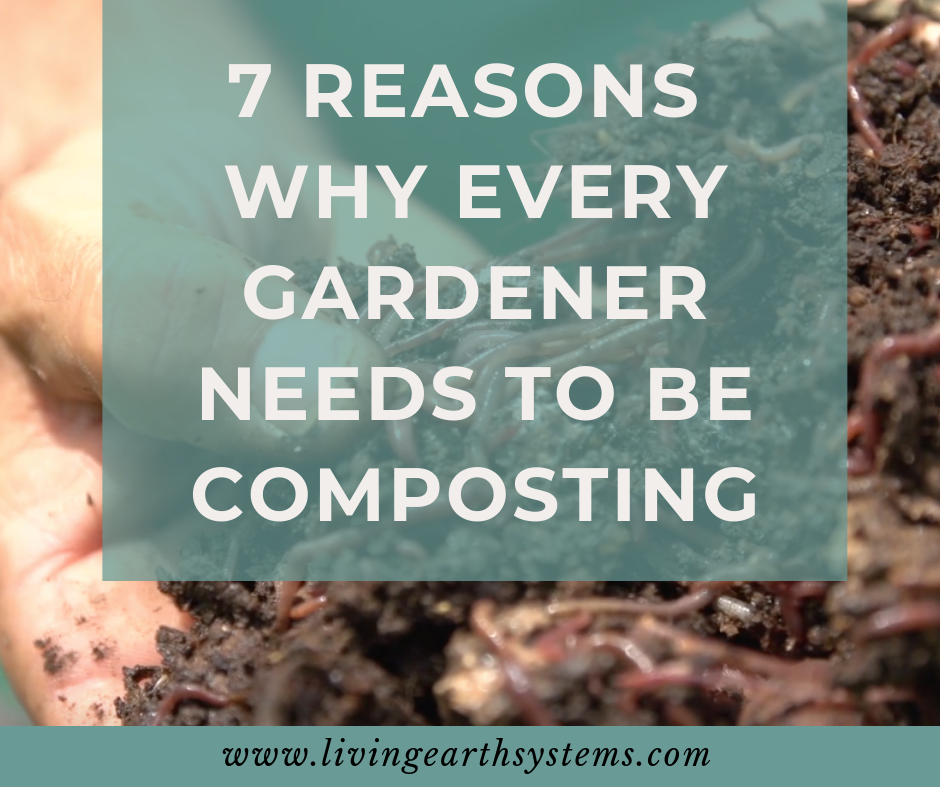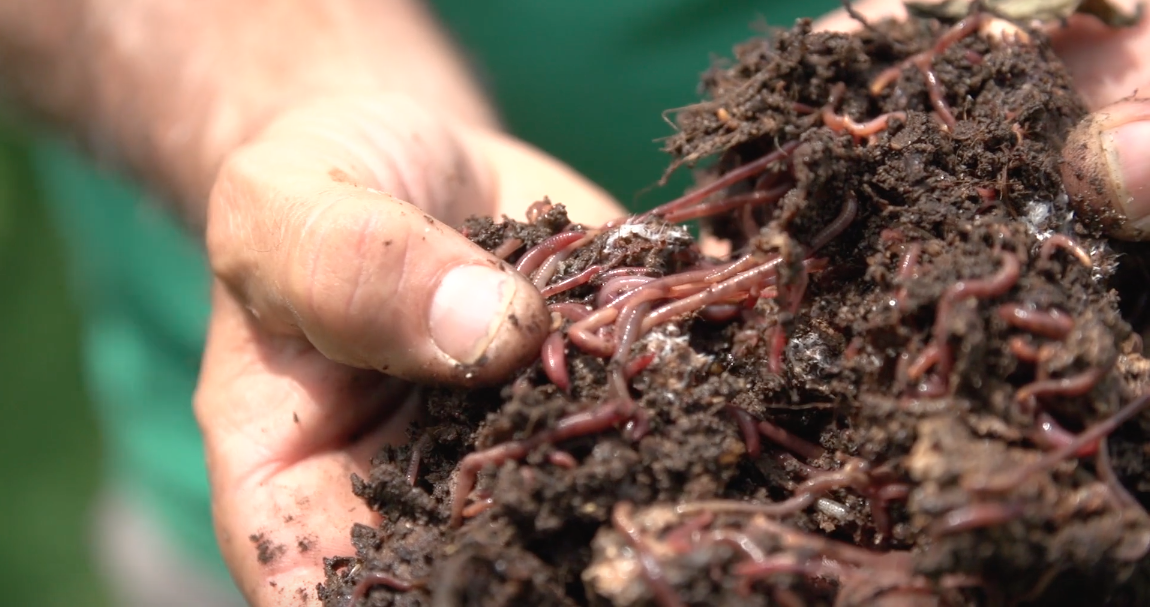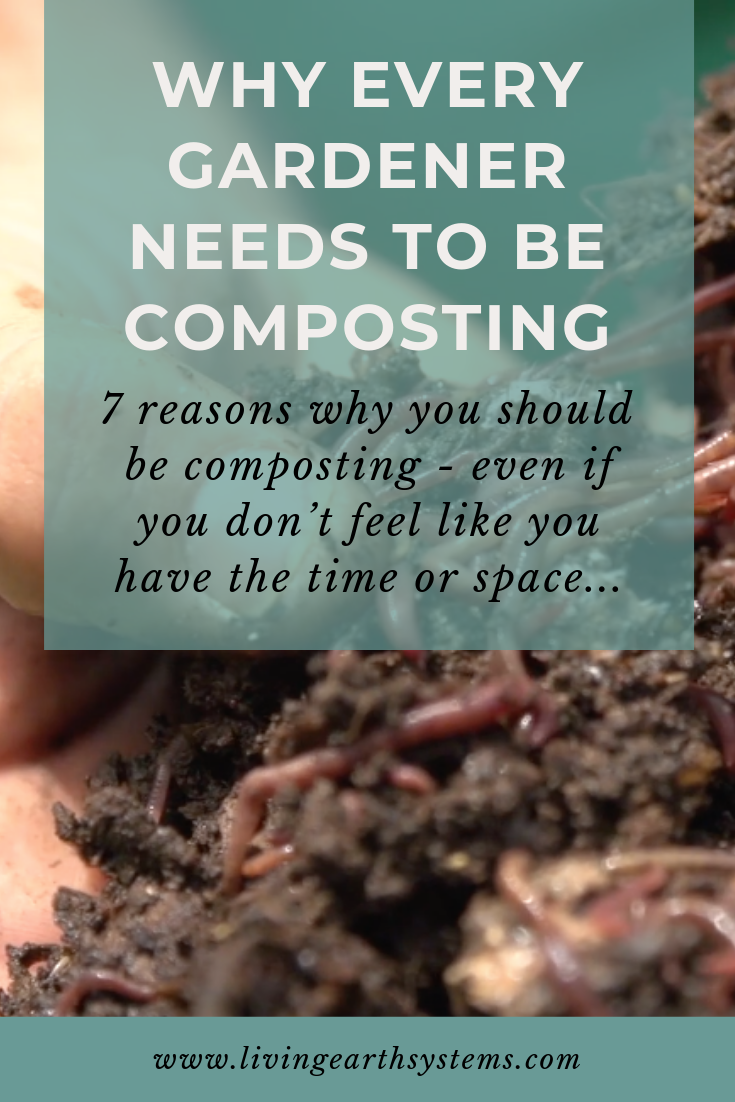Why composting is essential for your garden
Why does composting matter at all?
Why should gardeners learn how to compost?
Here are 7 reasons why you should really be composting – even if you don’t feel like you have the time or space…
1. Food Quality — Strategic composting for better crops & better food
The first thing that comes to mind when people ask me about this is… Where your food comes from & knowing your farmer.
I visit many farms — some that say they are “organic,” but you have to ask yourself, what do they mean when they say “organic?”
To me, “organic” means being able to create your own (or support others making) fertilizer from responsibly sourced organic material, not using chemical fertilizers, pesticides, or herbicides, managing the weeds by pulling them, promoting diversity and life within the soil, and also not using genetically modified crops.
The reality of organic farming is that most do not have a compost pile. They are not composting material from the farm, but getting compost and fertilizer from somewhere else that is less than responsibly sourced.
“YOU ARE WHAT YOU EAT… AND WHAT YOU EAT EATS.”
Moringa seedlings that we’re growing not only to eat ourselves as superfoods, but also to strategically compost. By growing incredibly nutrient-packed plants to feed to our compost, we know that the plants we grow for food will have everything they need to thrive and to be nutrient-packed themselves.
If you value organic and you wanna learn how to grow your food, your first step needs to be to learn how to grow your soil. If you learn how to grow your soil then you learn how to grow yourself because growing yourself is based on what you eat and what you eat eats. In order to grow ourselves via our food, our food needs something to grow itself. So we need to grow our food’s food — the soil, water, air, and light that our food “eats.”
Fertile soil (a main component of what our food “eats”) is built with rock material that has been broken down through creatures, erosion, sunlight, water… all these different things that break rock down and allow it to be mixed with organic matter, water, air, and the living creatures that help us in our gardens and farms. Rocks provide minerals for fertile soil.
What is soil made of?
Soil is basically made out of minerals + organic material + air + water
In order to build a cubic-yard of living soil you need to have organic material. So how do you break organic material down? You compost it. You allow it to take the process that nature does of composting it, whether that’s through chemical thermophilic action or whether that’s through a living cold compost.
BUT WHY SHOULDN’T GARDENERS JUST GET IT FROM THE LANDFILL, OR BUY COMPOST FROM THE HARDWARE STORE? WHY SHOULD THEY BE BUILDING IT THEMSELVES?
Why should you buy compost when you could just be building it yourself? (to answer a question with a question)
Perhaps you believe that you don’t have enough space?
Perhaps you believe it’s inconvenient?
And if these are the questions you’re asking yourself, perhaps you should be buying your compost from someone else, but you can still be responsible enough and arm yourself with the knowledge to make sure that they’re doing it right.
If you buy it from someone else they can *say* what’s in it, but do you really know what’s in it?
Where did they source what’s in it?
Those are questions to ask yourself.
A lot of the time you go to the store and you’ll be buying some “organic” fertilizer and it’s made of manure, or ground up bones, blood, and creatures that have died from the bad conditions from horrifically-farmed chicken factories (or any of the other animal slaughtering industries). This also happens with creatures scraped from the bottom of our oceans, taking advantage of islands for their bat guano, just for a few examples of a whole list of irresponsibly sourced “organic” fertilizers.
THAT’S NOT ORGANIC TO ME!
When you’re feeding animals GMO crops and everything else under the sun – hormones and antibiotics, and just giving it a cruel life… that doesn’t seem to me to be organic or anything you’d want to put in your garden to feed the food that feeds your family.
THE IDEA OF BEING ABLE TO GROW YOUR FOOD MEANS YOU’RE ABLE TO GROW YOUR SOIL.
Being able to grow your soil means you need to be composting! You can buy someone else’s compost (when you properly interview them on their methods and view their farm and feel really good about who you’re buying compost from) and mix it with mineral material, air and water — Yes, you can grow soil that way, but the whole idea of taking it into your own hands means you know exactly what’s in it and exactly what you’re going to get out of it. You have these control measures to empower yourself. It’s sort of like cooking from scratch.
The real black gold.
2. Green Waste / Yard Waste: They only call it “waste” if you waste it.
Stuff that would normally be wasted and go to the landfill, like leaves, grass clippings, weeds… Many people call that “green waste.” We call it green waste because you’re wasting it.
Instead of wasting it by collecting it in those big “green waste” bags, and leaving them on the curb every week… you can utilize it as awesome green material for composting and building soil!
This also applies to your paper scraps. Why send all of your paper towels, scrap paper, cardboard… to the dump when it can be building soil for your garden?
Now a lot of people are confused and think it’s awesome to get all that material back from the landfill as compost — often given to the neighborhoods for free. But what you really need to know – what are they using for their nitrogen source? More times than not, and I would confidently say, in MOST waste management facilities, they’re processing the green waste with porta potty material and excess sewer sludge. They’re claiming that because it reaches high temperatures and sterilizes itself that it can be used to grow organic food. To me this is ridiculous. You’re basically eating sh!t… Not to mention the amount of methane released into our atmosphere through large municipal composting operations, which is contributing to climate change, and has many other ecological impacts.
If you read one of our case studies, How We Turned a 1/4-acre Parking Lot into a Closed-Loop Micro-Farm in 1 Year (that now feeds 9 children, 11 adults & deepens their connection to nature so they can align with their values), then you know that we were able to compost all of the paper waste, yard waste, and food scraps from multiple households & grow thousands of pounds of veggies from it.
3. You get to be apart of the solution
Why should people care about building soil? Because usable living topsoil is becoming a rare resource.
“Generating three centimeters of top soil takes 1,000 years, and if current rates of degradation continue all of the world’s top soil could be gone within 60 years,” according to Maria-Helena Semedo of the UN’s Food and Agriculture Organization (FAO). [1]
Also according to the FAO, a third of the world’s soil is now moderately to highly degraded. [1]
Large-scale agriculture & deforestation allows for the topsoil to be vulnerable to the open atmosphere through water erosion and wind. It’s at the bottom of our oceans, and a lot of different places.
So we really really really need to be building soil!
I mean, there are a million different reasons why I can tell you to be composting and building soil.
But the first of two major points are that you can only grow good food with good soil. And the second being that it is a seriously scarce commodity.
4. THERE’S ALSO COMPOSTING FOR CARBON SEQUESTRATION
You can sequester carbon in the ground through growing plants and through properly composting organic material.
Adding a thin layer of compost on the top 4 inches of the ground actually creates cycle in which your garden holds more carbon from being released into the atmosphere. Even fungi from underground can sequester carbon, which is something that you can include in your soil building system.
5. Seeding your garden with symbiotic relationships
Another reason to compost is that you can put creatures that assist in growing vibrant, healthy food into your compost.
A host of species assist in a thriving garden, like earthworms, fungi, and indigenous microorganisms (IMO’s)… When you make your own compost using cold strategic composting, you can actually seed your compost with these beneficial critters and cultures that are local to your unique environment and that make your garden more resilient.
One major lesson that we teach is that using compostable material like leaves and brush that are local to the area, you’re pretty much going to know that IMO‘s that take part in the composting process are a least somewhat indigenous to a healthy system in your area. For instance, if you’re trucking compost from several miles away (or purchasing compost from the store that was made thousands of miles away) where the environment is different than yours, there’s going to be a different set of microbes and creatures in that compost because it was grown in a different area so it may take a little bit of time to be recolonized by the indigenous microbes of your area. It could even be over-colonized with another microbe that can overwhelm the indigenous microbes from your area and not allow them to build up.
These are things you want to pay attention to when you make your own compost. You can be in charge of exactly what’s in it.
6. ADDRESSING YOUR GARDEN’S SPECIFIC NEEDS
What are you looking for in your area or garden? Every area and every garden is unique with unique needs.
Are you looking for calcium?
Are you looking for potassium?
Is the soil super acidic or alkaline?
These are some of the questions you wanna ask yourself and you want to think about when growing food. You can absolutely address imbalances in your garden through strategically composting specific components.
We grow vetiver because of it’s incredibly deep taproot that mines minerals from deep in the earth. Cutting the vetiver grass and composting it builds soil that’s full of all of those minerals that the taproot accessed + it becomes available to all of the plants we grow in our garden.
7. GROWING YOUR DESTINY
So why should you be making my own compost? It means that you can be in charge. When you make your own compost you can create your own roadmap to where you want to go and chart your own course for your garden. You’re in charge of your own destiny since you grow yourself at home and how you’re going to grow your children and how you’re going to grow your plants which are going to grow you and your children ultimately.
We planted fava beans in a new garden to fix Nitrogen into the soil. Now we get to eat fava beans as a crop!
In order to be in charge of the situation to know that you’re doing something that is indigenous to your area why wouldn’t you use the material from your area that’s going to the dump. Instead of it going to the landfill put it to work for you. You can grow food out of it! Don’t let it be wasted!
“DON’T WASTE IT. USE IT!”
Go ahead… Pin me!
[1] “Only 60 Years of Farming Left If Soil Degradation Continues.” Scientific American, https://www.scientificamerican.com/article/only-60-years-of-farming-left-if-soil-degradation-continues/. Accessed 24 July 2019.






